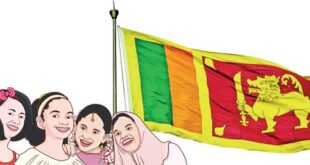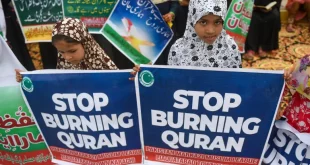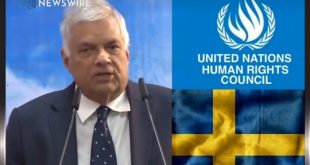December 16 marks the 38th anniversary of the breakup of Pakistan when the Eastern wing of the country emerged as Bangladesh after an India-backed secessionist movement. The occasion calls for highlighting the plight of about 250,000 so-called Biharis or stranded Pakistanis still languishing in unsanitary camps in Bangladesh.
Who are the so-called Biharis or stranded Pakistanis?
In pre-independence India, the Biharis were an Urdu-speaking Muslim minority in the Hindu dominated province of Bihar. In 1947, at the time of independence or partition, the Biharis moved to what was then East Pakistan. When the civil war broke out in East Pakistan, the Biharis, who consider themselves Pakistani, sided with the Pakistan army.
More than one million Urdu-speaking Biharis (also called stranded Pakistanis) were left behind as the Pakistani army and civilians were evacuated since the East Pakistan became an independent state, Bangladesh. All properties belonging to non-Bengalis were confiscated by the executive order of the interim President of Bangladesh. At the same time, there were summary executions by firing squads, mass decapitations, rape and mutilation. In the wake of revenge killings they fled their homes and sought sanctuary in some 166 Red Cross camps while awaiting repatriation to Pakistan. By the end of 1972 there were over one million displaced persons in these camps, which were so squalid that one UN official declared in desperation that the site he had visited could be described as nothing more than a concentration camp.
In 1972, when the Bangladesh government offered citizenship, an estimated 600,000 accepted it but over 500,000 persons opted to repatriate to Pakistan. Those choosing relocation to Pakistan anticipated that their move would be swift. They were wrong. Despite an agreement signed by Bangladesh, India and Pakistan to repatriate all these people to Pakistan, the government of General Ziaul Haq issued an ordinance in March 1978 stripping all Pakistanis left in Bangladesh after December 1971 of their nationality, unilaterally, retroactively, arbitrarily and en masse.
Now they found themselves unwelcome in both countries. Pakistani governments disowned these people on the grounds that their entry into Pakistan would create greater racial, linguistic and ethnic problems in the country and Bangladesh scorned them for having supported the enemy.
Ironically neither the United Nations nor the International Red Cross and Crescent Society recognize them as refugees. hey have been denied refugee status because they are not considered displaced people. The Office of the United Nations High Commissioner for Refugees (UNHCR) has not addressed the plight of the Biharis.
Promises of repatriation
In December 1973 International Committee of Red Cross completed registration of 539,669 persons who want to return to Pakistan. In 2006 a report estimated between 240,000 and 300,000 Biharis live in 66 crowded camps in Dhaka and 13 other regions across Bangladesh.
India, Bangladesh and Pakistan signed an agreement in August 1973 under which all those who opted for Pakistan were to be repatriated. Following the New Delhi Tripartite agreement, first batch of 120,000 stranded Pakistanis was airlifted to Pakistan in 1974.
In 1988 the Government of Pakistan signed an agreement with Muslim World League, Mecca, Saudi Arabia establishing a Trust called Rabita Trust Fund to arrange repatriation and rehabilitation of all stranded Pakistanis from Bangladesh. The Trust was active until 1998.
After a wait of about two decades, in January 1993 when Pakistan took back the first batch of 300 Bihari from Bangladesh they were far from universally welcome. Native Sindhis, championed by the Pakistan People’s Party, opposed their settlement in their province. The process of repatriation has been stopped since 1993.
A ray of hope had emerged when in 2002 during his visit to Bangladesh the President of
Pakistan Pervez Musharraf assured the representatives of the stranded Pakistanis to resolve this matter on priority basis. However, despite several assurances from different prime Ministers of Pakistan the matter is still unresolved.
On May 19, 2008, the Dhaka High Court granted right of Bangladesh citizenship to the second generation of Biharis who were born in the camps. The court held that any Urdu speaker (Bihari) born in Bangladesh, or whose father or grandfather was born in Bangladesh, and who was a permanent resident in 1971 or who has permanently resided in Bangladesh since 1971 is a citizen “by operation of law.” Persons who affirm or acknowledge allegiance to a foreign state (such as Pakistan) may be disqualified, however. The court directed the Bangladesh Election Commission (BEC) to enroll majority age Urdu speakers who wish to be registered and to issue them national identity cards (IDs) “without any further delay.” Between 70 -80% of all Urdu-speakers registered and received their national identity documents. Among those that did not were those who retained a wish to repatriate to Pakistan.
Continued Misery in the Camps
Despite recent progress in voter and ID registration, 38 years of non-recognition has left around 200,000 Urdu-speaking people living in abject poverty and vulnerable to discrimination.
The camps where these stranded people are staying for almost four decades are the classic examples of subhuman living that has hardly any difference with animal life. Dingy and stinky atmosphere, merger of both water and sewerage lines, lack of latrines and clean water are constant threats to health.
Malnutrition of children in absence of proper food and medicine threatens their usual physical growth on one hand and absence of education turns them into dark generation on the other.
Each family has been given one room — 6 feet by 6 feet. But who wants to know that these families have grown in size over the years. Sometimes, 10 people live in one room, spanning three generations.
Wars and conflicts have displaced millions of people around the world, but those who flee such conflicts normally receive international attention and extensive media coverage. Internecine fighting among Afghan groups or conflicts in the Horn of Africa have drawn world reaction with aid agencies and UNHCR scrambling to help them. In the case of the stranded Pakistanis, if anybody knows, nobody has bothered to help alleviate their sufferings.
In due course most of the people of Pakistan also forgot about these stranded Pakistanis who were being projected as patriots during the 1971 war and its immediate aftermath. These “patriots” of 1971 are now considered as “pariahs” by Pakistan that has stopped owning them as it fears that, on migration, they would settle in Sindh province and join the ethnic political ranks of Mohajirs (the Urdu speaking people who migrated from India to Pakistan after independence in 1947.) The stranded Pakistanis or Biharis are trapped between the conflicting histories and ideologies of the South Asian sub-continent.
 Sri lanka Muslims Web Portal Diversity and Inclusiveness
Sri lanka Muslims Web Portal Diversity and Inclusiveness



